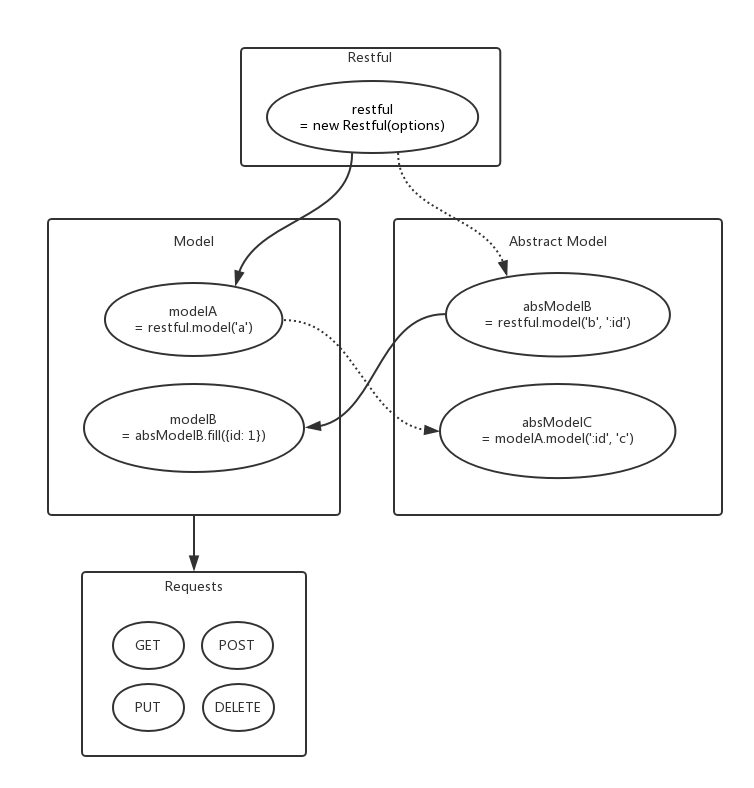restful-fetch v0.6.4
restful-fetch


A RESTful library based on isomorphic-fetch.
Installation
$ npm i restful-fetchQuick start
import Restful from 'restful-fetch';
const restful = new Restful();
const Foo = restful.model('foo');
Foo.get().then(data => console.log(data)); // GET /foo
Foo.Single = Foo.model(':id');
Foo.Single.fill({id: 1}).get().then(data => console.log(data)); // GET /foo/1
Foo.Bar = Foo.Single.model('bar');
Foo.Bar.fill({id: 1}).get().then(data => console.log(data)); // GET /foo/1/barDocuments
Overview
Everything is a model, derives from models and derives models.

Restful
A Restful instance is the root model, which has a few properties to be shared
by all its derivatives. The properties are:
prehandlersposthandlerserrhandlers
The handlers will be discussed more as interceptors.
Parameters
options: (Optional) Object
root: (Optional) String
Base address for all requests, default as
''.headers: (Optional) Object
Default request headers.
config: (Optional) Object
Extra config to be passed to fetch.
methods: (Optional) Object
Custom methods to be bound to models. The object are composed of
methodName: methodInfopairs.methodInfomay have following properties:methodThe HTTP method to be used for requests, default as
GET.argsThe argument name list. Names may be
url,params,bodyandheaders.
const restful = new Restful({ root: '/api', headers: { 'X-From': 'restful-fetch', }, methods: { foo: { method: 'GET', args: ['url', 'params'] } } }); // restful.foo(url, params)
Methods
An Restful instance has all methods that a derived model has, except for fill,
which should only work in abstract models.
const restful = new Restful(options);
// or
const restful = Restful(options);Model
A Model instance is an object derived from a Restful instance or another model.
A model instance has following properties:
prehandlersposthandlersoverrides
The handlers will be discussed more as interceptors.
Methods
model(...args: []String)
Derive a submodel.
A model is always generated by
instance.model(...args). Each argument is a part of URL and will be joined with/as the submodel's relative path.If a part of URL starts with
:, it will be marked as a placeholder. Models with placeholders are abstract models, and can not make requests directly. Abstract models have to befilled with data to get non-abstract models before making requests. This is designed to share properties between different model instances.fill(data: Object)
Derive a new
Modelinstance with placeholders filled withdata.datais an object with keys as the placeholder names and values to be filled with.request(options: Object)
A low-level request method called by
get,post,put, etc.optionsmay have following properties:- url: String, default as
'' - method: String, default as
GET - headers: Object, default as
null - params: Object, default as
null - body: Any, default as
null
- url: String, default as
post(url: String, data: Any, params: (Optional) Object)
POSTrequest.get(url: String, params: (Optional) Object)
GETrequest.put(url: String, data: Any, params: (Optional) Object)
PUTrequest.patch(url: String, data: Any, params: (Optional) Object)
PATCHrequest.delete(url: String, params: (Optional) Object)
DELETErequest.
const Cars = restful.model('cars');
const AbstractCar = restful.model('cars', ':id');
// or
const AbstractCar = Cars.model(':id');
AbstractCar.prehandlers.push(function () {
console.log('Get a car!');
});
const car1 = AbstractCar.fill({id: 1});
const car2 = AbstractCar.fill({id: 2});
const seats = car1.model('seats');
seats.get().then(data => console.log(data));Interceptors
Restful and Model instances have a several handler properties, which contains
lists of interceptors.
Those on Restful instances are global interceptors and those on Model instances
are model specific interceptors.
prehandlers(present onRestfulandModel)Process order:
Model::prehandlers -> Restful::prehandlers.Each prehandler is called with one parameter: the request options. Returned value will be merged into it, so only the changed attributes need to be returned.
posthandlers(present onRestfulandModel)Process order:
Restful::posthandlers -> Model::posthandlers.Each posthandler is called with two parameters:
data, options.datais the current data object and can be modified by returning a new one.optionscontains all information of the request, includingmethod,url(full url),relative(url relative to current model).There are two default posthandlers on a Restful object so that you may either resolve the response data or reject an object with the response object and its data:
response => ({response, data})({response, data}) => response.ok ? data : reject({response, data})
errhandlers(present onRestful)Each errhandler is called with the error captured. The last errhandler should throw the error to make a rejection to the promise.
overrides(present onModel)Overrides global handlers on
Restfulobject for current model.
const restful = new Restful();
const model = restful.model('/cars/1');
// Global interceptors will be processed for all requests
restful.prehandlers.push(options => {
return {
params: Object.assign({}, options.params, {hello: 'world'}),
};
});
restful.posthandlers.push(res => {
console.log('Intercepted:', res);
return res;
});
// Model interceptors will be processed only for the model itself
// Model prehandlers will execute BEFORE global prehandlers
model.prehandlers.push(options => {
return {
headers: {
'X-From-Model': true,
},
};
});
// Model posthandlers will be processed AFTER global posthandlers
model.posthandlers.push(data => {
return data || 'empty';
});
model.overrides = {
posthandlers: [], // disable global posthandlers
};